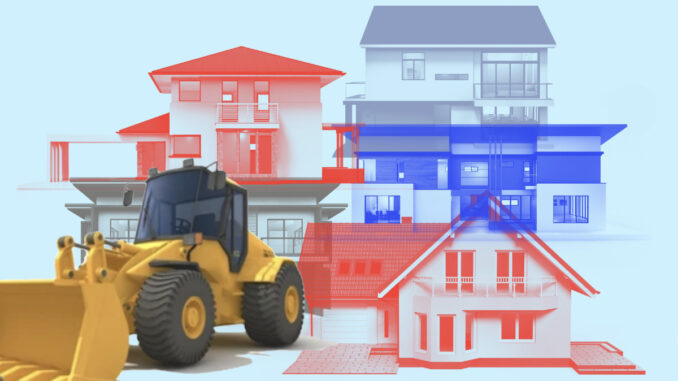
MONTVALE—Republican Mayor Michael Ghassali launched an effort last week to increase support and raise funds for a legal battle aiming to equally apportion affordable housing obligations statewide.
A statewide affordable housing advocacy group now regards the mayor’s effort as “just making noise.”
Ghassali seeks support from New Jersey’s 565 communities for a proposed lawsuit to equally distribute affordable housing obligations, including 62 currently exempt “urban aid” towns. He emailed mayors, councilmembers, and public officials statewide, appealing for their support and a $20,000 contribution towards future legal fees.
Ghassali told Pascack Press that three attorneys have applied to represent the growing coalition of towns in the lawsuit, and an affordable housing counsel would be hired soon.
However, Alex Staropoli, a spokesperson for Fair Share Housing Center, which advocates for affordable housing in legal cases statewide, criticized Ghassali’s effort as “just making noise” rather than a proposal of “real solutions.”
Staropoli said, “Urban aid municipalities do have affordable housing obligations under new legislation and always have under the Mount Laurel Doctrine. Their obligations are based on existing substandard housing — the present need — and often exceed those of towns like Montvale. Mayor Ghassali’s effort to undermine the Mount Laurel Doctrine is just another attempt to exclude low-income residents and people of color from his town.”
Staropoli added, “The affordable housing crisis in New Jersey requires a multi-pronged approach. The Legislature and Governor’s actions in passing Assembly Bill 4/Senate Bill 50 are a strong step towards addressing that crisis. More is needed — even full compliance with Mount Laurel would still leave a significant deficit of affordable homes. It’s time for mayors to propose real solutions instead of just making noise.”
Ghassali’s email included a sample resolution for towns to consider and asked for a $20,000 commitment over two years (2024 and 2025) for legal fees. So far, only Old Tappan has committed, unanimously passing a resolution on June 17.
Ghassali set an Aug. 14 deadline for towns to pass a resolution and commit to funding the legal challenge, a difficult task as many towns meet monthly during the summer.
Ghassali aims to enlist at least 62 communities in the legal fight and raise up to $1.2 million to mandate the 62 now-exempt municipalities to share affordable housing obligations. He believes requiring these municipalities to build their “fair share” of affordable housing would reduce the burden on non-exempt towns like Montvale.
A chart posted June 25 by Ghassali on his Facebook page lists the 62 “urban aid” towns now exempt from obligations, including Asbury Park, Clifton, Jersey City, Hoboken, Weehawken, Newark, Montclair, Belleville, Bloomfield, Cliffside Park, Lodi, Lakewood, Long Branch, New Brunswick, Neptune, North Bergen, Nutley, West New York, and Woodbridge.
A “fourth round” of affordable housing obligations is expected by Oct. 20, calculated by the state Department of Community Affairs. A new affordable housing law was signed by Gov. Phil Murphy in March 2024. The fourth round officially begins in July 2025 and runs through July 2035.
Ghassali says, “Sixty-two towns with transportation hubs, strong commercial sectors, and local employment have been permitted to develop residentially with no state mandate for affordable housing. Requiring these towns to share in the state’s affordable housing obligation would allow for needs to be apportioned across all municipalities.”
Montvale’s proposed legal challenge demands the 62 “urban aid” communities now exempt from affordable housing obligations be required to construct affordable housing.
“It’s patently unfair that the obligations of Jersey City, Hoboken, and 60 other municipalities should be shifted to the rest of New Jersey’s communities,” writes Ghassali.
The New Jersey chapter of the American Planning Association echoed similar concerns in its analysis of the new affordable housing law. They noted that exemptions based on the Municipal Revitalization Index are outdated and suggested using more reliable data.
Ghassali via email also aims to overturn what he calls “egregious examples of legislative overreach,” including unrealistic obligations unsupported by proper market studies, new punitive requirements, and procedural deadlines. “We are prepared to make our case in state and federal courts,” wrote Ghassali.
A similar legislative effort to include exempt “urban aid” communities in New Jersey’s affordable housing obligations (Senate Bill-2103; Assembly Bill-971) was introduced in January 2024. This legislation, introduced annually since 2016, has never advanced past committee.
Senate Bill 2103 argues that exemptions can lead to undue development burdens on other municipalities and that directing affordable housing development to urban areas would help minimize urban sprawl and utilize existing infrastructure.
Former Assemblywoman Holly Schepisi, who introduced the legislation with the late Republican Senator Gerald Cardinale, expressed support for Ghassali’s efforts. Schepisi said, “With towns banding together, they’ll have a chance to challenge the new obligations. This new law requires towns to build significantly more affordable units, even if they lack vacant land.”
Schepisi criticized the new law for focusing primarily on rental units rather than homeownership, which she argued was the original intent of the Mount Laurel Doctrine. “The law intended to create opportunities for low-income housing to right historical wrongs for black and brown people and provide opportunities for home ownership that provides generational wealth,” she said.
We reached out to the state Department of Community Affairs for comment on Ghassali’s efforts but did not hear back by press time.
